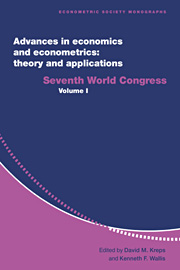Book contents
- Frontmatter
- 1 Trade and wages
- 2 Politics and trade policy
- 3 Economic analysis of political institutions: an introduction
- 4 Game-theoretic models of market structure
- 5 Rationality and knowledge in game theory
- 6 Experiments and the economics of individual decision making under risk and uncertainty
- 7 Theory and experiment in the analysis of strategic interaction
- 8 Evolutionary game theory in economics
- 9 Learning from learning in economics
- Index
1 - Trade and wages
Published online by Cambridge University Press: 05 January 2013
- Frontmatter
- 1 Trade and wages
- 2 Politics and trade policy
- 3 Economic analysis of political institutions: an introduction
- 4 Game-theoretic models of market structure
- 5 Rationality and knowledge in game theory
- 6 Experiments and the economics of individual decision making under risk and uncertainty
- 7 Theory and experiment in the analysis of strategic interaction
- 8 Evolutionary game theory in economics
- 9 Learning from learning in economics
- Index
Summary
Many influential people are firmly convinced that the growth of the world trade and especially the growing exports of manufactured goods from developing countries are the main cause of declining wages and rising unemployment in the west. Widely quoted publications, like the World Economic Forum's World Competitiveness Report, state flatly that western prosperity is no longer sustainable in the face of increased global competition; even the European Commission's 1993 White Paper Growth, Competitiveness, Employment asserts that the most important cause of rising European unemployment is the fact that “other countries are becoming industrialized and competing with us - even on our own markets - at cost levels which we simply cannot match.”
It is not surprising that the idea of a close link between growing trade and declining wages has become widely accepted. The image of global competition - for markets and for capital - that undermines the position of labor is a simple and compelling one, which makes intuitive sense to businessmen and politicians. Moreover, the attribution of domestic woes to international competition appeals strongly to what one might call the fashion sense of policy intellectuals. Not only does the mere use of the world “global” help to convey an image of worldly sophistication; a story that links together the growth of world trade, the rise of Asia, the fall of Communism (which has opened up new outlets for capital and converted new nations to capitalism), and the decline of the west has a sweep and glamour that ordinary economic analyses lack.
- Type
- Chapter
- Information
- Advances in Economics and Econometrics: Theory and ApplicationsSeventh World Congress, pp. 1 - 18Publisher: Cambridge University PressPrint publication year: 1997
- 1
- Cited by



